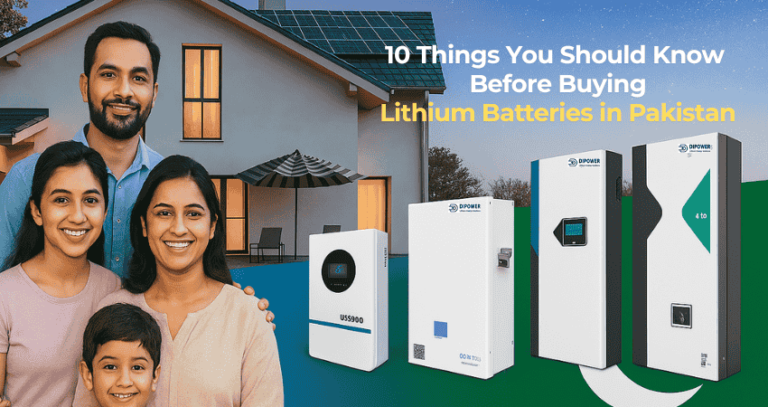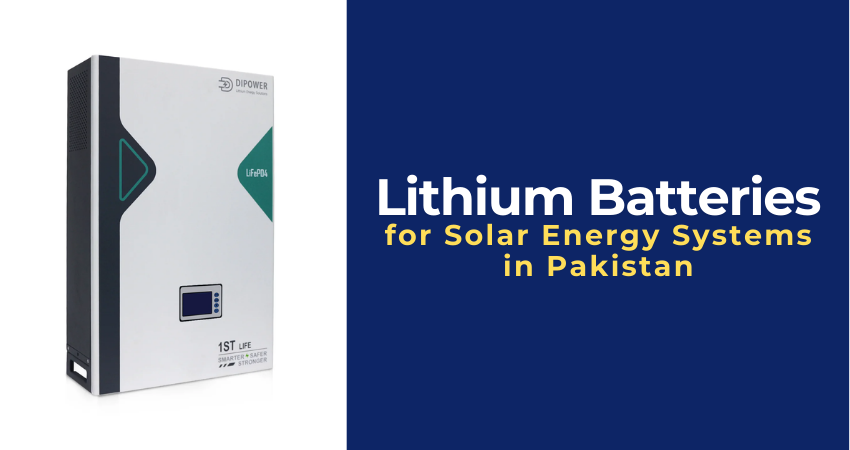As the demand for solar energy solutions in Pakistan grows, choosing the right lithium battery is crucial for ensuring efficiency, reliability, and long-term savings. Investing in a high-quality solar battery can significantly enhance your solar system’s performance.
Below are 10 essential factors to consider before making your purchase.
1. Compatibility with Hybrid Inverter
Not all lithium batteries are compatible with hybrid inverters. When selecting a battery, ensure it seamlessly integrates with your solar inverter to avoid inefficiencies.
Check manufacturer recommendations and ensure compatibility with OEM/ODM brands like Inverex, Knox, Ziewnic, and International brands like Growatt, Goodwe, Sungrow, or Solis. Some batteries require additional communication protocols, so verify the BMS (Battery Management System) connectivity before purchase, such as RS232, Rs484, and CAN.
2. Protection and Safety Features
Safety is a top priority when purchasing a lithium battery for solar systems. Look for built-in safety mechanisms such as:
- Overcharge and over-discharge protection
- Short circuit prevention
- Thermal runaway management
- Fire-resistant casing and cooling systems
Batteries with LiFePO4 (Lithium Iron Phosphate) chemistry are preferred due to their superior safety profile.
3. Cells and BMS Brand
The quality of a lithium battery heavily depends on the battery cells and BMS (Battery Management System) brand. Some of the best cell manufacturers include:
- CATL (Contemporary Amperex Technology Co. Limited)
- BYD
- EVE
- Gotion
- Great Power
BMS Battery Management System is a PC Board that communicates between the Hybrid inverter and battery cells, protecting them from overcharging and discharging, and maintaining Current and charge and discharge rates.
- Pylontech
- Darren
- Pace
- Daly
A buyer can check the brand of BMS and connectivity before purchase, such as RS232, Rs48,4, and CAN. A high-quality BMS ensures proper energy management, balancing, and longevity of the battery pack.
Read: Difference Between 48V and 51.2V LiFePO4 Batteries
4. Warranty Terms and Conditions
A strong warranty policy indicates a manufacturer’s confidence in its product. When selecting a lithium battery, consider:
- Warranty period (5 to 10 years is ideal)
- Cycle life (Should exceed 4000 cycles at 80% Depth of Discharge)
- Manufacturer’s reputation for honoring warranty claims
Carefully read the terms and conditions to avoid warranty voiding situations like improper installation or usage, and liability of the manufacturer or distributors in warranty claims.
Dipower has been offering a 5-year replacement warranty to users.
5. Pricing and Investment
While lithium batteries are an expensive upfront investment, they provide long-term savings due to their higher efficiency and longer lifespan. When evaluating costs, consider:
- Price per kWh of storage capacity
- Installation and maintenance costs
- Return on investment (ROI) based on energy savings
Investing in a reputable brand might cost more initially, but it saves money in the long run. Currently in Pakistan, lithium battery prices of 48V 100AH are between 200,000 PKR to 300,000 PKR.
6. Longevity and Durability
The lifespan of a lithium battery is measured in charge cycles. A good LiFePO4 battery should last at least 10 years, depending on:
- Usage patterns
- Ambient temperature conditions
- Depth of Discharge (DoD)
Choose batteries designed for extreme weather conditions to ensure durability in Pakistan’s climate.
7. High Energy Density
Energy density refers to the amount of energy stored per unit volume or weight. Lithium batteries, especially LiFePO4 and NMC (Nickel Manganese Cobalt) variants, offer high energy density, making them ideal for compact solar energy storage. High energy density means:
- More power storage in a smaller space
- Lower weight for easy installation
- Better overall performance compared to lead-acid batteries
8. Fast Charging and Discharging
Lithium batteries are superior to lead-acid alternatives in charging speed. Look for features like:
- High charge acceptance rate
- Fast discharge capability for peak demand periods
- Support for solar MPPT controllers for efficient charging
Faster charging allows the battery to capture more energy during peak sunlight hours, improving overall system performance.
9. Depth of Release(DoD)
The DoD represents how much of a battery’s capacity can be used before recharging. For example:
- Lead-acid batteries typically allow 50% DoD
- Lithium-ion batteries support 80% to 100% DoD
A higher DoD means more usable energy, reducing the need for oversized battery banks.
10. Efficiency and Low Maintenance
Unlike lead-acid batteries, lithium batteries require minimal maintenance and offer higher round-trip efficiency (above 95%). Key benefits include:
- No need for water refilling
- No sulfation or acid stratification
- Higher charging efficiency means less energy wasted
Choosing a low-maintenance, high-efficiency lithium battery ensures a cost-effective, hassle-free solar energy storage solution in Pakistan.
Also Read: Why Lithium Batteries Are the Best Choice for Solar Energy Systems in Pakistan?
Conclusion
Investing in the right lithium battery for your solar system in Pakistan can significantly enhance energy independence, efficiency, and long-term savings. By considering compatibility, safety features, warranty, and efficiency, you can make an informed decision and maximize your solar investment.



